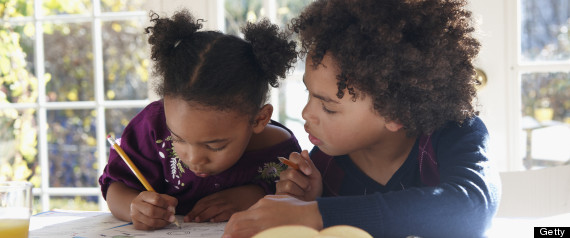
By Genevra Pittman
NEW YORK | Wed Aug 21, 2013 9:36am EDT
(Reuters Health) - Children who have an older sibling with autism are seven times more likely than other kids to be diagnosed with the disorder themselves, according to a new study from Denmark.
That extra risk is smaller than had been suggested in earlier studies.
Researchers also found a higher-than-average risk among children whose older half-sibling had an autism spectrum disorder (ASD) - especially if the two kids shared the same mother.
"I think a lot of autism researchers agree that the causes of autism are many and it's very complex," Therese Gronborg, who led the study at Aarhus University, said.
"If it was only genetics we would see a much higher recurrence rate" among siblings, she told Reuters Health.
About one in every 88 U.S. children has an ASD, according to the Centers for Disease Control and Prevention.
For their new study, Gronborg and her colleagues used birth, civil and psychiatric registries to track 1.5 million children born in Denmark between 1980 and 2004.
Through 2010, just over 13,000 of them had been diagnosed with an ASD. That included 276 children with an older sibling with autism who were also diagnosed with the disorder.
The researchers found the likelihood of a younger sibling being diagnosed with autism when an older sibling had an ASD varied between 4.5 and 10.5 percent, with an average of about 7 percent. There was no clear increasing or decreasing trend during the study period.
For half-siblings, the extra risk of autism was smaller: younger half-siblings who shared a father with an older sibling had a 1.5-times greater risk of ASDs if their sibling also had one, a finding that could have been due to chance.
Children who shared a mother with a half-sibling had a 2.4-times greater risk if their older brother or sister had autism, according to findings published in JAMA Pediatrics.
Gronborg said a woman's lifestyle during pregnancy or something about the intrauterine environment could affect her children's risk of autism.
"But it could also be something in the upbringing," she added.
The researchers noted that it's possible siblings of a child with an ASD are more likely to be diagnosed themselves in part because parents are more aware of the condition and its symptoms.
But they said the extra risk could also be an underestimate if parents who have one child with very severe autism are less likely to try to have more kids.
Gronborg and her colleagues said an autism risk of approximately 7 percent among younger siblings of children with the disorder should be "reassuring" for parents.
Zachary Warren, from the Treatment and Research Institute for Autism Spectrum Disorders at the Vanderbilt Kennedy Center in Nashville, Tennessee, said that rate is significantly lower than what's been found in studies of other groups.
Those have estimated autism recurrence rates in families are as high as 18 percent.
Warren, who was not involved in the new research, said the Danish findings might represent a "slightly conservative estimate."
"But it's a good study, and it's good information to have," he told Reuters Health.
Parents "really want to have more definitive information about recurrence risk. I would still be, at the end of the day, more comfortable talking to families about the range of known risks."
"No doubt there is an elevated risk and whether it (seems like) a high or low risk for families, they have to decide," Gronborg said.
"It's also an average based on many families, so for some families the risk will be higher."
SOURCE: bit.ly/1eY3zLN[1] JAMA Pediatrics, online August 19, 2013.
Copyright 2012 Thomson Reuters. Click for Restrictions[2] .
References
- ^ bit.ly/1eY3zLN (bit.ly)
- ^ Click for Restrictions (thomsonreuters.com)
- ^ Send us a tip (www.huffingtonpost.com)
- ^ Send us a photo or video (www.huffingtonpost.com)
- ^ Suggest a correction (www.huffingtonpost.com)


0 comments:
Post a Comment